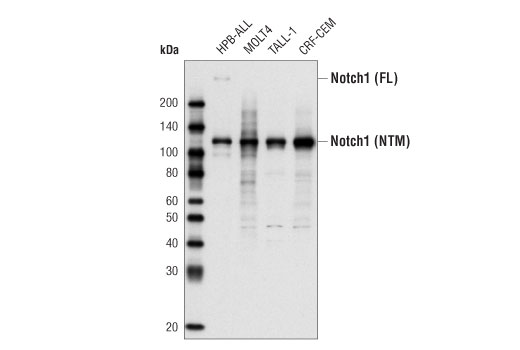
产品介绍
产品信息
来源纯化
Monoclonal antibody is produced by immunizing animals with a synthetic peptide corresponding to residues surrounding Pro2438 of human Notch1.

宿主
Rabbit

简单描述
Monoclonal Antibody for studying Notch1. Cited in 341 publications. Validated for WB, IP, IHC, ChIP. Available in 2 sizes. Highly specific and rigorously validated in-house, Notch1 (D1E11) XP® Rabbit Monoclonal Antibody (CST #3608) is ready to ship.

商品描述
Product Usage Information
For optimal ChIP results, use 5 μl of antibody and 10 μg of chromatin (approximately 4 x 106 cells) per IP. This antibody has been validated using SimpleChIP® Enzymatic Chromatin IP Kits.
| Application | Dilution |
|---|---|
| Western Blotting | 1:1000 |
| Immunoprecipitation | 1:50 |
| Immunohistochemistry (Paraffin) | 1:200 - 1:800 |
| Chromatin IP | 1:100 |

分子量
120, 300

应用
目标/特异性
Specificity/Sensitivity
Notch1 (D1E11) XP® Rabbit mAb detects intracellular epitopes between 2400 and 2500 amino acids of human Notch1. It recognizes both the full-length (~300 KDa) and the NTM region (~120 KDa), which consists of a short extracellular juxtamembrane peptide, a transmembrane sequence and the intracellular domain (NICD). The antibody cannot detect the extracellular (ligand-binding) domain of Notch1 following cleavage at the S2 site by ADAM-type metalloproteases.
Species Reactivity:
Human, Mouse, Rat

敏感性
Endogenous

背景
背景
Notch proteins (Notch1-4) are a family of transmembrane receptors that play important roles in development and the determination of cell fate (1). Mature Notch receptors are processed and assembled as heterodimeric proteins, with each dimer comprised of a large extracellular ligand-binding domain, a single-pass transmembrane domain, and a smaller cytoplasmic subunit (Notch intracellular domain, NICD) (2). Binding of Notch receptors to ligands of the Delta-Serrate-Lag2 (DSL) family triggers heterodimer dissociation, exposing the receptors to proteolytic cleavages; these result in release of the NICD, which translocates to the nucleus and activates transcription of downstream target genes (3,4).
1.Artavanis-Tsakonas, S. et al. (1999) Science 284, 770-6.
2.Chan, Y.M. and Jan, Y.N. (1998) Cell 94, 423-6.
3.Schroeter, E.H. et al. (1998) Nature 393, 382-6.
4.Rand, M.D. et al. (2000) Mol Cell Biol 20, 1825-35.

研究领域
癌症,发育生物学与干细胞研究,神经科学
制备和贮存
保存方式
Supplied in 10 mM sodium HEPES (pH 7.5), 150 mM NaCl, 100 µg/ml BSA, 50% glycerol and less than 0.02% sodium azide. Store at –20°C. Do not aliquot the antibody.For a carrier free (BSA and azide free) version of this product see product #67334.
数据库链接
Entrez-Gene ID
4851

UniProt ID
P46531

声明 :本官网所有报价均为常温或者蓝冰运输价格,如有产品需要干冰运输,需另外加收干冰运输费。








 用小程序,查商品更便捷
用小程序,查商品更便捷







 危险品化学品经营许可证(不带存储) 许可证编号:沪(杨)应急管危经许[2022]202944(QY)
危险品化学品经营许可证(不带存储) 许可证编号:沪(杨)应急管危经许[2022]202944(QY)  营业执照(三证合一)
营业执照(三证合一)